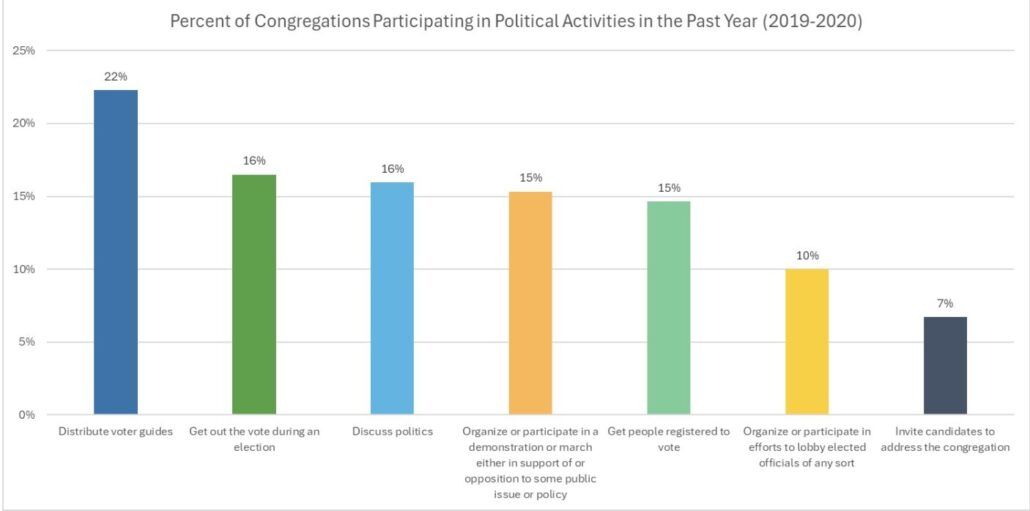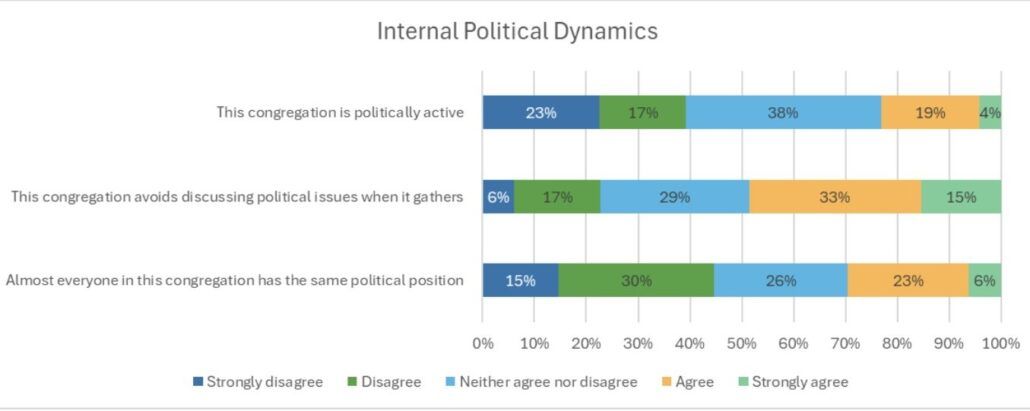Politics in the pews? Analyzing congregational political engagement

By Charissa Mikoski and Scott Thumma | Hartford Institute & Exploring the Pandemic Impact on Congregations
Over the past few months, many have explored the connection between religion and politics on the eve of the election. While much attention focuses on how a person’s religious identity corresponds with voting behaviors, less is known about the actual political engagement of religious organizations, such as churches, mosques, synagogues and temples. Congregations often get left out of conversations about religion and politics but are inferred to be influential. Popular assumptions suggest many churches and other places of worship are highly politically active, but is this supported by evidence?
Using data from over 17,000 congregations surveyed in early 2020, we examined how religious organizations actually engage in political activities. While there have certainly been shifts in the political and religious landscapes since 2020, this analysis provides a window into the behavior of congregations in ways often not explored. Our findings challenge common perceptions about the relationship between religious institutions and political behavior.
Most houses of worship remain politically inactive
We asked congregations if they engaged in seven core political activities over the previous 12 months. Only 40% engaged in any overtly political activity and most of those did it infrequently. This is consistent with historical findings from other surveys (such as the National Congregations Study) which found similar levels of political (in)activity by congregations.
The most common activity was distributing voter guides, done by less than a quarter of congregations (22%). Roughly 15-16% of congregations said they hosted events to discuss politics, get people registered to vote, get out the vote during an election or participate in demonstrations or marches. Only 10% said they participated in lobbying efforts. And less than 7% invited a political candidate to address the congregation.

We found a few differences by religious tradition. Most notably, Catholic and Orthodox parishes seemed to engage in these political activities at higher rates than their Protestant counterparts. Interestingly, evangelical Protestant congregations were not the most politically active as one may have expected based on the prevailing rhetoric concerning politics and religion.
Urban and Black congregations more likely to be politically active
Additionally, politically active congregations are more likely to be in urban settings, in the mid-Atlantic region, or have at least 50% of their participants who are Black or African American. Other factors such as the size of the congregation, age of the participants and recent growth or decline in attendance had no correlation with political activity.
The threat of losing their non-profit status might partly impede any overt political engagement by congregations, as 501(c)(3) organizations are banned from engaging in political campaign activity. However, there are likely other contributing dynamics, such as the internal political dynamics of a congregation.

Analyzing some of these internal dynamics, we found that only 23% of congregations self-identify as “politically active.” This self-identification positively correlates with the core political activities described above.
Half of congregations actively avoid political discussion
Further, about half (48%) of congregations reported avoiding discussing political issues when they gather. This active avoidance may seem counterintuitive when reading news headlines about how interwoven politics and religion have become for many Americans.
While nearly a third (29%) of congregations agree that the people in their congregation share the same political position, 45% disagree. Politically homogeneous congregations were less avoidant of political discussions, did more of the political activities discussed above and had less conflict over politics as compared to “purple” congregations that have participants from both political parties.
Finally, we asked congregations about whether they experienced recent conflict over political issues. Only 10% of congregations reported a recent conflict. Not surprisingly, those with recent political conflicts were less likely to be engaged in the political activities discussed above.

Popular narratives about religious political activity miss the mark
In conclusion, we find that most congregations do not engage in overt political activities, nor do many congregations view themselves as politically active. Further, the congregations who are engaged in these kinds of political activities do not fit the broader narrative of evangelical Protestants being more politically active. While these connections are present at the individual level, it does not appear to be happening at the organizational (congregational) level. Also, many congregations have a mix of political opinions present that may contribute to an avoidance of “hot button” topics altogether. Finally, only a small minority of congregations experience tension or conflict over politics.
This analysis is not to say that there is no connection between politics and religion. What we find, however, is that most congregations are not engaged in political activity in the ways one may expect. What congregations may do, however, is preach about current issues or certain topics that reinforce values that have become markers for one political party or the other. This may be indirectly influencing voters or signal how a “faithful person” should vote, but it is less overt than the assumed direct connection between congregational activity and voting behaviors described in popular rhetoric.
This content was originally published by Hartford Institute for Religion Research and Exploring the Pandemic Impact on Congregations at https://www.covidreligionresearch.org/. It may be republished for non-commercial purposes with proper attribution and an active link back to the original post.
The views expressed in this opinion column are those of the author. They do not necessarily reflect the views of FāVS News. FāVS News values diverse perspectives and thoughtful analysis on matters of faith and spirituality.





